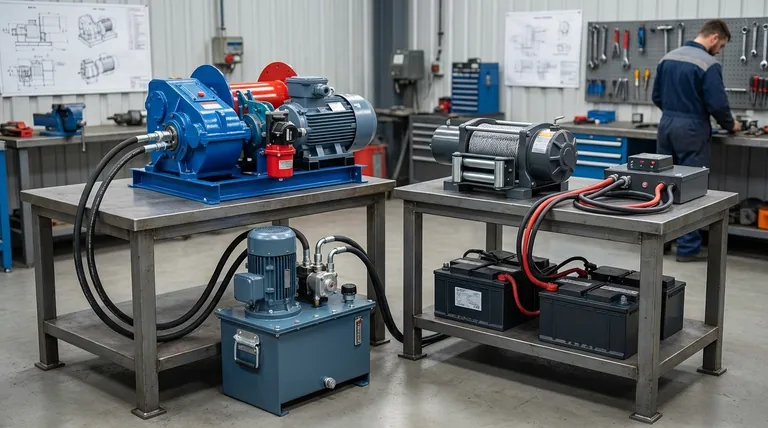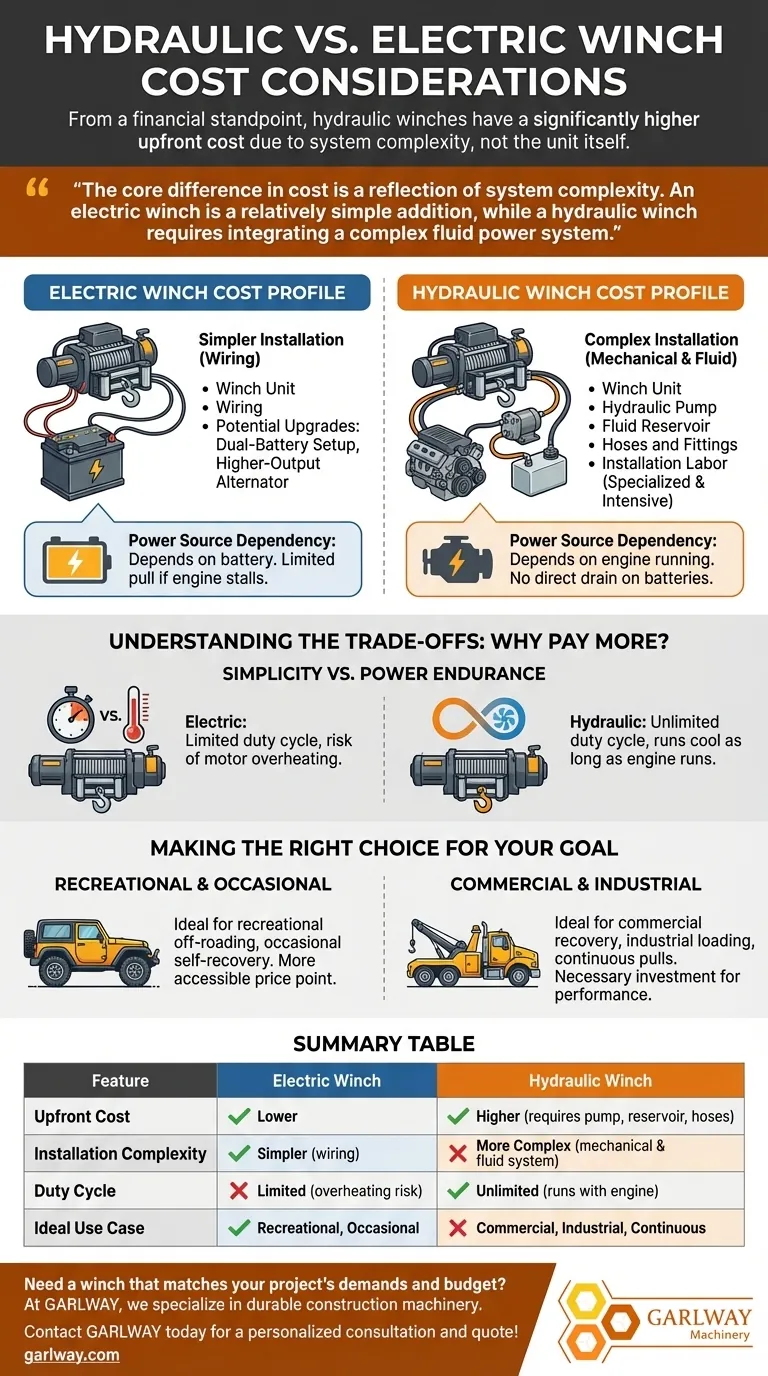From a purely financial standpoint, hydraulic winches have a significantly higher upfront cost than electric winches. This is not due to the winch unit itself, but rather the extensive supporting system required for its operation, including pumps, reservoirs, and custom hydraulic lines. An electric winch, in contrast, is a more self-contained unit that primarily requires a robust vehicle electrical system.
The core difference in cost is a reflection of system complexity. An electric winch is a relatively simple addition to a vehicle's electrical system, while a hydraulic winch requires integrating a complex, and therefore more expensive, fluid power system.

Breaking Down the Cost Components
The final price you pay for a winch system goes far beyond the price tag on the winch itself. The installation complexity and required supporting components are the primary cost drivers.
The Electric Winch Cost Profile
An electric winch is a more straightforward system. Its cost is primarily the winch unit, wiring, and any necessary upgrades to your vehicle's electrical system.
These upgrades can include a dual-battery setup or a higher-output alternator to handle the immense but short-term power draw. Even with these additions, the total installation cost is typically lower than a full hydraulic setup.
The Hydraulic Winch Cost Profile
A hydraulic winch is just one part of a larger system. To function, it must be powered by a hydraulic pump running off the vehicle's engine.
The total cost must therefore include the winch, a hydraulic pump, a fluid reservoir, and all the necessary hoses and fittings. If your vehicle doesn't already have a suitable power-take-off (PTO) or a heavy-duty power steering pump to tap into, this entire system must be installed from scratch.
The Impact of Installation Labor
Installing an electric winch is largely a wiring job, which is a common and relatively quick task for most mechanics.
Installing a hydraulic system involves mechanical integration with the engine, mounting pumps and reservoirs, and carefully routing high-pressure fluid lines. This is a more specialized and labor-intensive process, which directly translates to higher installation costs.
Understanding the Trade-offs: Why Pay More?
The higher cost of a hydraulic system buys you one critical capability: a near-unlimited duty cycle. This is the fundamental trade-off that should guide your decision.
Simplicity vs. Power Endurance
Electric winches are simple and cost-effective, making them the standard choice for most recreational and occasional-use scenarios. Their major limitation is heat; under a long, heavy pull, the electric motor can overheat and must be allowed to cool down.
Hydraulic winches run as long as the vehicle's engine is running. Because they are cooled by the circulating hydraulic fluid, they can pull continuously at their maximum rating without the risk of overheating. This is non-negotiable for many industrial and commercial applications.
Power Source Dependency
An electric winch depends entirely on battery power. If your engine stalls and you have a weak or single-battery setup, you may only get one short pull before the battery is depleted.
A hydraulic winch depends on the engine running to power the pump. While it won't work with a stalled engine, it places no direct drain on your batteries, preserving them for engine restarts and other critical functions.
Making the Right Choice for Your Goal
To determine which cost structure makes sense for you, you must first define your primary use case.
- If your primary focus is recreational off-roading or occasional self-recovery: An electric winch provides more than enough power and reliability at a much more accessible price point.
- If your primary focus is commercial recovery, industrial loading, or any application requiring long, continuous pulls: The higher upfront cost of a hydraulic winch is a necessary investment in performance and reliability.
Ultimately, aligning your choice with your operational demands ensures you are investing in the right capability for the job.
Summary Table:
| Feature | Electric Winch | Hydraulic Winch |
|---|---|---|
| Upfront Cost | Lower | Higher (requires pump, reservoir, hoses) |
| Installation Complexity | Simpler (wiring) | More Complex (mechanical & fluid system) |
| Duty Cycle | Limited (risk of motor overheating) | Unlimited (runs as long as engine runs) |
| Ideal Use Case | Recreational, Occasional Recovery | Commercial, Industrial, Continuous Pulling |
Need a winch that matches your project's demands and budget?
At GARLWAY, we specialize in durable construction machinery, including winches, concrete mixers, and batching plants for contractors and construction companies worldwide. Our experts can help you select the right winch—whether electric or hydraulic—to ensure reliability and value for your specific application.
Contact GARLWAY today for a personalized consultation and quote!
Visual Guide

Related Products
- Electric and Hydraulic Winch for Heavy Duty Applications
- Electric 120V Boat Winch by Badlands
- 12000 lb Heavy Duty Electric Boat Winch
- Heavy Duty Electric Boat Winch Windlass Anchor
- Electric Hoist Winch Boat Anchor Windlass for Marine Applications
People Also Ask
- What should be checked before daily operation of the hoist? A Comprehensive Pre-Use Safety Guide
- What are the primary uses of a slow-speed winch? Precision Control for Heavy Lifting
- What are the operational characteristics of a traditional hoist? Master Safe, High-Torque Lifting
- Why is the hoisting device considered indispensable in modern engineering machinery? The Key to Boosting Productivity and Safety
- What are the key features of Quick windlasses? Versatile, Electric, and Built for Ease
- How is the standard transmission form of a hoist structured? A Guide to Core Components & Safe Operation
- What alternative solution is mentioned for rope bunching issues? Prevent Rope Bunching with a Crowned Drum
- What are the benefits of using a winch for mud extrication? Achieve Safe, Efficient Vehicle Recovery














